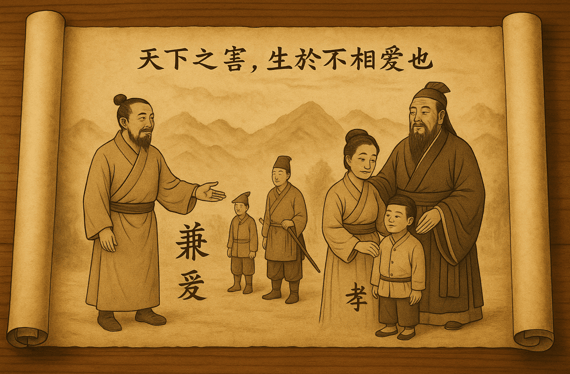Filial Piety vs Impartial Caring
Confucius Said Love Your Family. Mozi Said Love Everyone. Who Was Right?


Mozi was one of the earliest and most influential Chinese philosophers. Born shortly after Confucius, Mozi likely studied briefly with Confucian scholars but soon became a fierce critic of their teachings. So let's see what Mozi thought Confucius got wrong.
One of Mozi's central disagreements with Confucius was his rejection of the Confucian emphasis on filial love, which emphasized a special devotion to one's family as the ethical foundation of society. Instead, Mozi advocated for "impartial caring" (兼爱, jian ai): treating everyone with equal compassion and kindness.
With that being said, I want to emphasize that Mozi did not ignore the fact that human nature is to favor your own family; Mozi just wanted his philosophy to urge people to strive for the ideal of impartial caring rather than further entrenching one's familial ties.
Mozi believed society suffered greatly from favoritism, leading to injustice and conflict. He famously argued:
天下之害,生於不相愛也。
"All the harms in the world arise from not loving each other equally."
Mozi proposed that states and individuals should care for others as much as they care for their own. He emphasized that many injustices arise because people show favoritism, especially those in power, harming those without. He argued these issues could be resolved if everyone had a fundamental goal of treating each other impartially.
To illustrate his philosophy, Mozi used a thought experiment: imagine leaving your family behind indefinitely. You must choose someone to care for them. Would you prefer someone who loves only their family or someone who treats everyone impartially? Mozi argued that the impartial person would be the better choice.
Throughout history, the Mohist philosophy of "impartial caring" gradually fell out of favor as Confucian ideals became the foundation of Chinese society. Mozi’s emphasis on equality and universal concern struggled to compete with the deeply rooted, family-centered worldview promoted by Confucianism.
However, the spirit of impartial caring saw a brief revival under Maoist socialism. Mao’s revolution sought to dismantle old hierarchies, redistribute land, and promote loyalty to the collective above all else. Though reframed through Mao's political ideology, the echoes of Mozi’s vision still seem to reverberate throughout China today.
Looking back, there is some common ground between Mozi and Confucius. The idea of impartial caring closely resembles the golden rule, which Confucius himself supported when he said: 己所不欲,勿施于人—"What you do not wish for yourself, do not do to others." Both philosophers ultimately agree on the core principle that we should treat others with empathy and respect.
Anyway, this was an interesting debate that I thought I'd share, and leaves us with an interesting question:
Would the world be a better place if everybody strived to ignore their natural bias towards family and cared for everybody equally?